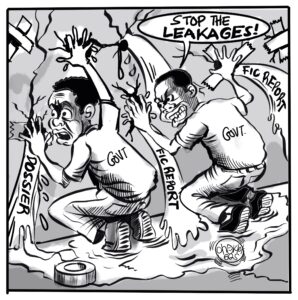The Seventh National Alternative Mining Indaba (NAMI) has demanded for urgent reforms in order to improve safety standards following the Black Mountain disaster where 10 small-scale miners died.
And the Indaba resolved, among other things, that government should ensure that there is an effective and progressive taxation for Zambia to mobilise resources to realise development aspirations and tackle poverty and inequality.
Delivering a communique on behalf of stakeholders, NAMI committee chairperson Tommy Singongi called on the government to institute measures to improve health and safety standards in the mining industry following the Black Mountain disaster that claimed at least 10 lives on Wednesday.
“The 2018 NAMI begins by expressing our condolences and standing in solidarity with the families of the victims and survivors of the accident that occurred yesterday on June 20, 2018, at the infamous Black Mountain site in Kitwe. We expect and demand to see measures by government to adequately handle the challenges associated with the Black Mountain, and similar sites, with regards to health, safety, environmental protection – safeguarding the rights and benefits of host communities and preservation of the rule of law. Critical lessons will have to be obtained from the unfortunate event and put on record. We also express our unwavering support and solidarity with all other people who are victims of economic, environmental and social injustices surrounding the mining activities that tend to place profit first before the people,” Singongi stated in the communique, Thursday.
And the Indaba resolved that government should ensure that there is an effective and progressive taxation for Zambia to mobilise resources to realise development aspirations and tackle poverty and inequality
“We affirm that transparent, effective and progressive taxation is critical for Zambia to mobilise resources to realise development aspirations and tackle poverty and inequality. We note with concern that the government has been over-dependent on mining and foreign direct investment as the path to development at the expense of other people-centred alternatives; we, therefore, encourage that the government promotes strategies that ensure that the interest of the citizens is not compromised, encourages diversification and promotes local content. [We] recommend that Government to put in place a stable and consistent tax system in the mining sector to guarantee that extraction effectively contributes to state revenues for development; recommend that government must continue to review tax incentives and treaties to include cost benefit analysis of current tax incentives, such as the capital allowance deductions, which contribute to the low marginal effective tax rate in the mining sector. Demand for greater transparency and accountability laws, policies and systems in order to tackle secrecy, structures and investments that facilitate tax avoidance and evasion,” stated Singongi.
“Demand that the government quickens the establishment of an inclusive Mining Industry Reform Tax Team to determine optimal tax rates for the sector and other pertinent issues, as announced by the Ministry of Mines in November, 2017, and affirmed during his official opening of the NAMI 2018 by the Honourable Minister of Mines and Minerals Development. Demand that the Government introduces and implement a revenue-sharing mechanism in the mining sector that allocates 10 per cent of taxes paid by mining firms, to go directly to mining host communities. Demand that corporations’ tax responsibilities and compliance be increased and not override their corporate social responsibility. Cognizant that Zambia remains richly-endowed with vast mineral resources, yet 54.4 per cent of its citizens currently live in poverty and having had fruitful deliberations, the following are the recommendations emanating from the NAMI discussions on how we believe Zambia can better harness the full benefits of its vast mineral sector for inclusive growth and socio-economic development. While we recognize some improvements brought about by the Mines and Minerals Act No 11 of 2015, we note with concern that there exist several gaps in the legal framework that hinder transparency, accountability and the overall benefit of Zambian citizens from the proceeds of the extractives industry. Some of the identified challenges evident in both the Mineral Resources Development Policy of 2013 and the Act include the failure to balance investment promotion and the protection of the rights and interests of citizens.”























